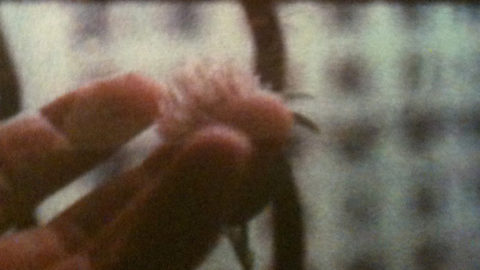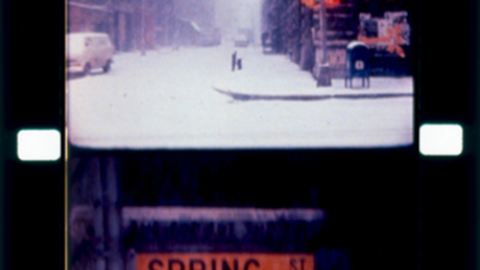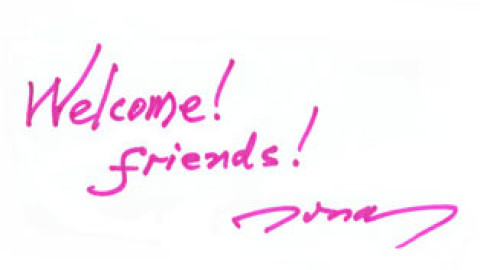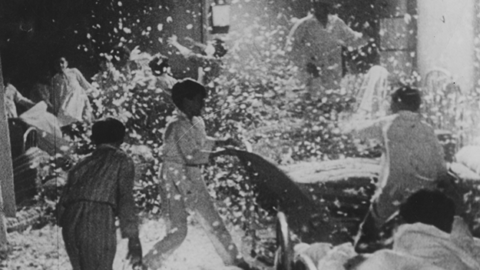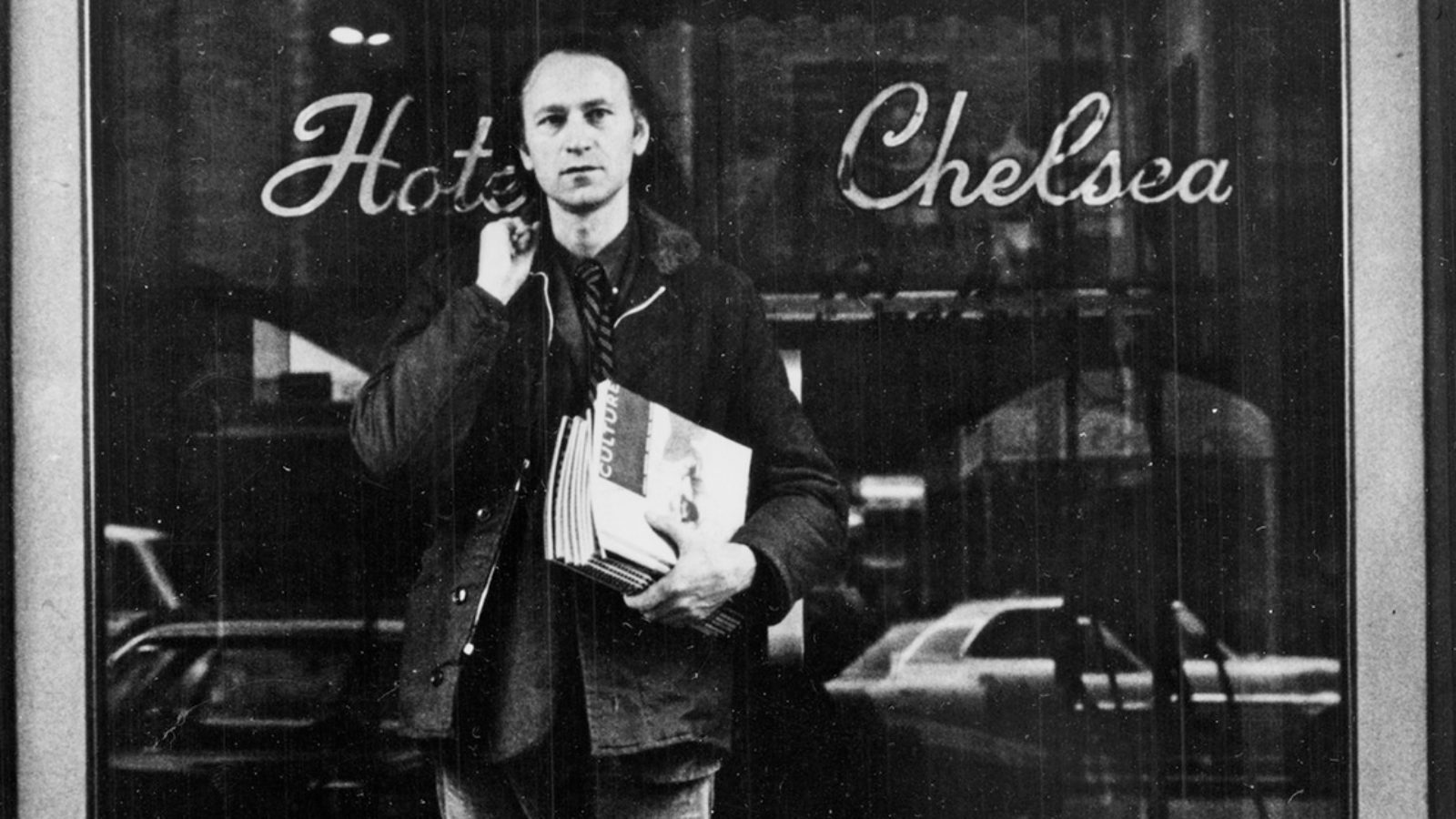
Statement
In the first week of March, 1964, Jonas Mekas and three others were arrested on obscenity charges for screening Jack Smith's Flaming Creatures at the New American Cinema. According to The Village Voice, the following Saturday, Mekas proceeded to run "continuous half-hour showings of the Jean Genet film 'Un Chant D'Amour,' a homosexual love story set in a prison, at the Writers’ Stage Theatre," with police watching from outside. Mekas wrote the below statement, published in the Winter 1964 issue of Film Comment, in response to his arrest.
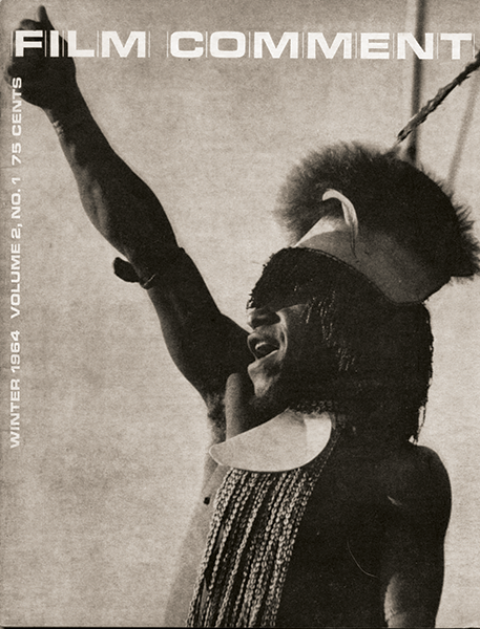
Jonas Mekas, film director and editor of Film Culture, has issued the following statement in regard to his recent arrest:
Like Flaming Creatures, the Genet film, Un Chant D’Amour, is a work of art and like any work of art it is above obscenity and pornography, or, more correctly, above what the police understand as obscenity and pornography. Art exists on a higher spiritual, aesthetic and moral plane.
The new American film maker does not believe in legal restrictions placed upon works of art; he doesn’t believe in licensing or any form of censorship. There may be a need for licensing guns and dogs, but not for works of art.
Our art is for all the people. It must be open and available to anybody who wants to see it.
The existing laws are driving art underground.
We refuse to accept the authority of the police to pass judgement on what is art and what is not art: what is obscenity and what is not obscenity in art. On this subject we would rather trust D. H. Lawrence or Henry Miller than the police or any civic official. No legal body can act as an art critic.
Hollywood has created an image in the minds of the people that cinema is only entertainment and business. What we are saving is that cinema is also art. And the meanings and values of art are not decided in courts or prisons.
Art is concerned with the spirit of man, with the sub- conscious of man, with the aesthetic needs of man, with the entire past and future of man’s soul. Like any other art, like painting, music or poetry, our art cannot be licensed or censored. There is no one among us to judge it. We have not only the Constitutional right but more important, the moral right, to communicate our work to ‘other people.
To consider Flaming Creatures or Un Chant D’Amour obscene by a few extracted images, taken out of context, and to make a criminal case thereof, without making an attempt to understand the work as a whole, or the true meaning of the said details, is indeed a narrow, naive and unintelligent way of looking at things.
The detective from the District Attorney’s office, who arrested us with Flaming Creatures, told us that he was not interested in the film as a work of art; he also admitted that he was not competent to judge it; he said he was looking at it strictly as a matter of “duty”; he was looking only for “objectionable” images according to his interpretation of the law.
That is O.K., as far as the duty of a hired man is concerned-but what the hell does this have to do with truth or justice? The meaning and essence of a detail in a work of art can be understood only if grasped in the context of the whole.
You may ask why, with already one “obscenity” charge against me, I am screening another film which in the eyes of the police is considered “obscene.”
I am doing so because I consider the police actions unlawful, unconstitutional and contrary to man’s spiritual growth.
It is my duty as an artist and as a man to show the best work of my contemporaries to the people.
It is my duty to bring to your attention the ridiculousness and illegality of the licensing and obscenity laws.
The duty of the artist is to ignore bad laws and fight them every moment of his life.
The duty of the citizen and artist is not to let the police and the law abuse the rights of the people, both the Constitutional rights and the unwritten, moral rights.
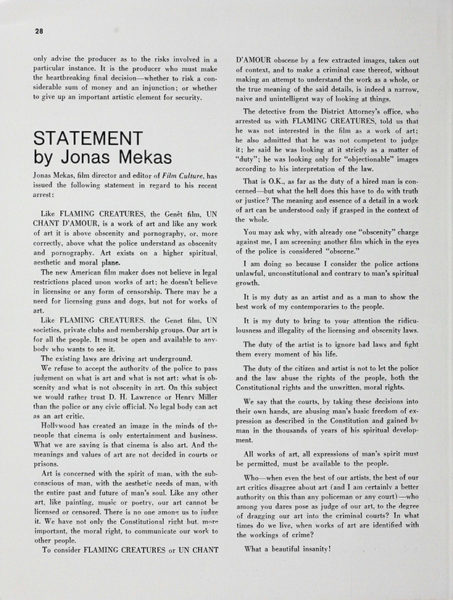 We say that the courts, by taking these decisions into their own hands, are abusing man’s basic freedom of expression as described in the Constitution and gained by man in the thousands of years of his spiritual development.
We say that the courts, by taking these decisions into their own hands, are abusing man’s basic freedom of expression as described in the Constitution and gained by man in the thousands of years of his spiritual development.
All works of art, all expressions of man’s spirit must be permitted, must be available to the people.
Who—when even the best of our artists, the best of our art critics disagree about art (and I am certainly a better authority on this than any policeman or any court)—who among you dares pose as judge of our art, to the degree of dragging our art into the criminal courts? In what times do we live, when works of art are identified with the workings of crime?
What a beautiful insanity!



